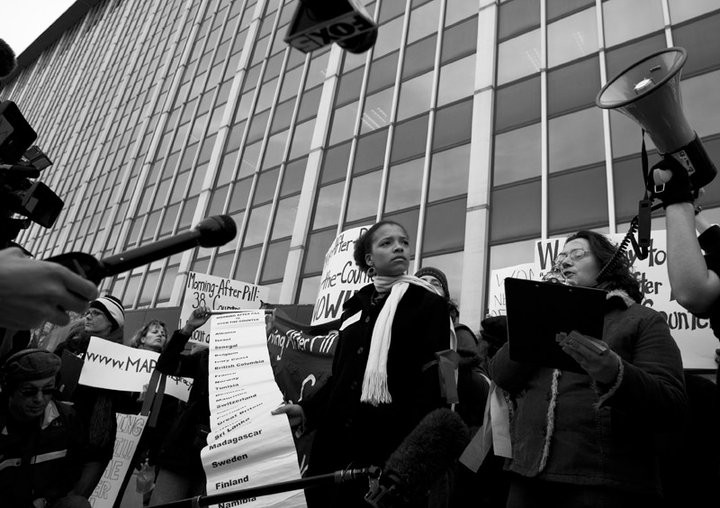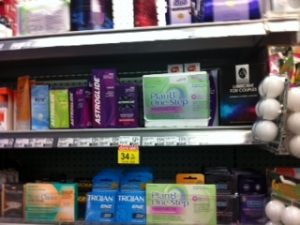
Landmark Birth Control Victory
Morning-After Pill Goes Over-the-Counter
By Allison Guttu, Alexandra Leader and Jenny Brown
For over ten years, grassroots feminists with National Women’s Liberation — including the lead plaintiff Annie Tummino — have been waging the most important fight in decades to expand access to birth control in the United States: making the Morning-After Pill available over-the-counter without any restrictions.
On April 5, 2013, a U.S. federal judge in Tummino et al. v. Hamburg ordered that the Morning-After Pill be made available “without a prescription and without point-of-sale or age restrictions within thirty days.”
The FDA ignored the ruling but announced in early May that it would put the Morning-After Pill on the shelf for 15-and-over (but everyone would have to prove their age when they pay). Under-15 year olds would still have to get a prescription from a doctor.
This bizarre new scheme has the same problems we had before when the Morning-After Pill (also known as “emergency contraception,” Plan BTM, or Next Choice®) was only available without a prescription for females 17 years old and up and was still behind pharmacy counters, forcing everyone to show an ID and be “carded” to buy it.
After the FDA announcement, the Obama administration appealed the federal judge’s ruling, which means that they will not comply with the judge’s order and put it on the shelf for all ages, at least not yet.
We won’t rest until the Morning-After Pill can be stocked on any shelf in any store, next to the condoms, aspirin, or shampoo and no prescription or identification will be needed to buy it, no matter what your age or gender (we think men should take responsibility by shopping for it, too).
The Morning-After Pill prevents pregnancy up to five days after sex, but is most effective within the first 24 hours. This makes the prescription requirement ludicrous and unworkable, not to mention adding cost. It is unnecessary because the pill is safe—safer than birth control pills and safer than aspirin. The Morning-After Pill (MAP) is not RU-486, which induces an abortion. If you are already pregnant, the Morning-After Pill will not work.
Having this form of birth control at our fingertips will give women more say over whether and when we have children, but it will also give us more leverage. If we had complete control of our reproduction, we suspect that the U.S. would look a lot more like Europe, where birth control is easily available, and there are many fewer unintended births, and a lower birth-rate overall.*
As a result, in European countries and elsewhere, governments openly worry about the low birth rate and encourage parenting with year-long paid maternity leaves, months of paternity leave, visiting nurses for parents of infants, paid sick leave by law, free or subsidized childcare, cash allowances from the government for each child, and many other benefits we only dream of here. Besides, they all have universal health care.

Here, we have to jump through hoops and pay high costs for birth control and abortion, while the government slashes the few tiny programs, like Head Start, that actually help us raise children.
National Women’s Liberation has been at the forefront of this struggle, from sitting in at the FDA, resulting in arrest; defying the prescription requirement and handing the Morning-After Pill out on the street to those who needed it; holding speak-outs outside of Health and Human Services; flashmobbing a pharmacy to put it on the shelf ourselves; to filing this lawsuit against the Food and Drug Administration and Health and Human Services.
The Morning-After Pill is already available without a prescription in at least 63 other countries, including the United Kingdom, France, Denmark and Ghana. We are slowly catching up, but it shouldn’t have taken over a decade of pressure from feminists, our allies and a lawsuit, and now more hoops and appeals from the FDA and the Justice Department.
In addition to these new hurdles, there is a still a huge fight ahead of us on the cost of birth control, including the Morning-After Pill. We advocate for coverage through a truly universal national health insurance system (single-payer).
Tummino is an example of organized feminism waging a legal battle, which has been effective because it’s part of a broad mobilization. Because National Women’s Liberation’s campaign included breaking the very prescription requirements we sought to change, NWL members were the perfect plaintiffs to represent the interests of all women, who, just like them, needed the Morning-After Pill to be over-the-counter with no restrictions. The Center for Reproductive Rights approached National Women’s Liberation members and the lawsuit was filed shortly after in January 2005.
Clearly, a court case alone did not get us this far, and a court case alone will not win advances for women. A strong and active “dues-paying feminist” membership** is needed to secure and advance the victories won in the courtroom.
________________
* Redstockings draws attention to the history of European “birth strike” idea in Women’s Liberation and National Health Care: Confronting the Myth of America (2001).
** See “Buttons” tab on Redstockings website: http://www.redstockings.org.
